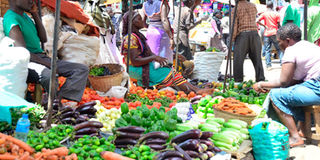Commonwealth in standards reform

Mr Godwin Muhwezi, fruits, vegetables and maize are some of the products currently rejected by markets such as the European Union. FILE PHOTO
What you need to know:
- According to UNBS principal public relations officer Godwin Muhwezi, fruits, vegetables and maize are some of the products currently rejected by markets such as the European Union.
- Complaints from these markets range from aflatoxins and lack of traceability, which is key in identifying the source of contaminated produce.
Kampala. Small and medium enterprises within the agricultural sector are expected to have easier access to international markets following the launch of the Commonwealth Standards Network (CSN) in Uganda.
The Commonwealth Standards Network, according to Uganda National Bureau of Standards (UNBS) is a programme implemented by the UK Department for International Development.
It will cost about Shs3b and is expected to run until March 2020, mainly seeking to equip UNBS with knowledge in standards’ development and simplifying commonly used standards for small and medium enterprises.
“We are not competing favourably because if you look at the share of exports, it is limited and we could do more and the issue is that we are constrained because we do not meet the requirements of the international market,” said Mr David Ebiru, the UNBS deputy executive director management and financial services in Kampala yesterday.
The Commonwealth is a community of 53 sovereign states with intra-commonwealth trade worth $60bn per year.
It is expected to increase to $1 trillion by 2020 and by 2030 to $2.75 trillion, according to Commonwealth deputy secretary-general Deodat Maharaj.
UNBS has, so far, developed more than 3,000 standards but the Commonwealth insists knowledge around those standards must be updated with the latest changes to remove barriers to intra-commonwealth trade.
Mr Graham Holloway, the CSN Africa team leader, said the programme also looks to extend assistance down the agricultural value chain because primary producers are the ones who ultimately create employment in the economy but most importantly contribute to growth of the country’s gross domestic product (GDP).
UNBS has, for years, struggled with substandard products on the market and latest figures indicate at least 54 per cent of goods do not meet quality requirements.
Once it is implemented, the programme will simplify standards on handling products such as fish, fruits, vegetables, coffee, other foods and beverages for the market but also see to it that they are translated to local languages so that producers who need them can get their products certified.
“There is a lack of understanding in many areas about what you need to do to get your products certified. Some people do not even know that they have to be certified. We will use agricultural extension officers to pass this message and by doing so, farmers will either sell their product for the first time or have a lower rejection rate,” Mr Holloway said.
According to UNBS Principal Public Relations Officer
Mr Godwin Muhwezi, fruits, vegetables and maize are some of the products currently rejected by markets such as the European Union.
Complaints from these markets range from aflatoxins and lack of traceability which is key in identifying the source of contaminated produce.
Rejected goods
According to UNBS principal public relations officer Godwin Muhwezi, fruits, vegetables and maize are some of the products currently rejected by markets such as the European Union.
Complaints from these markets range from aflatoxins and lack of traceability, which is key in identifying the source of contaminated produce.




